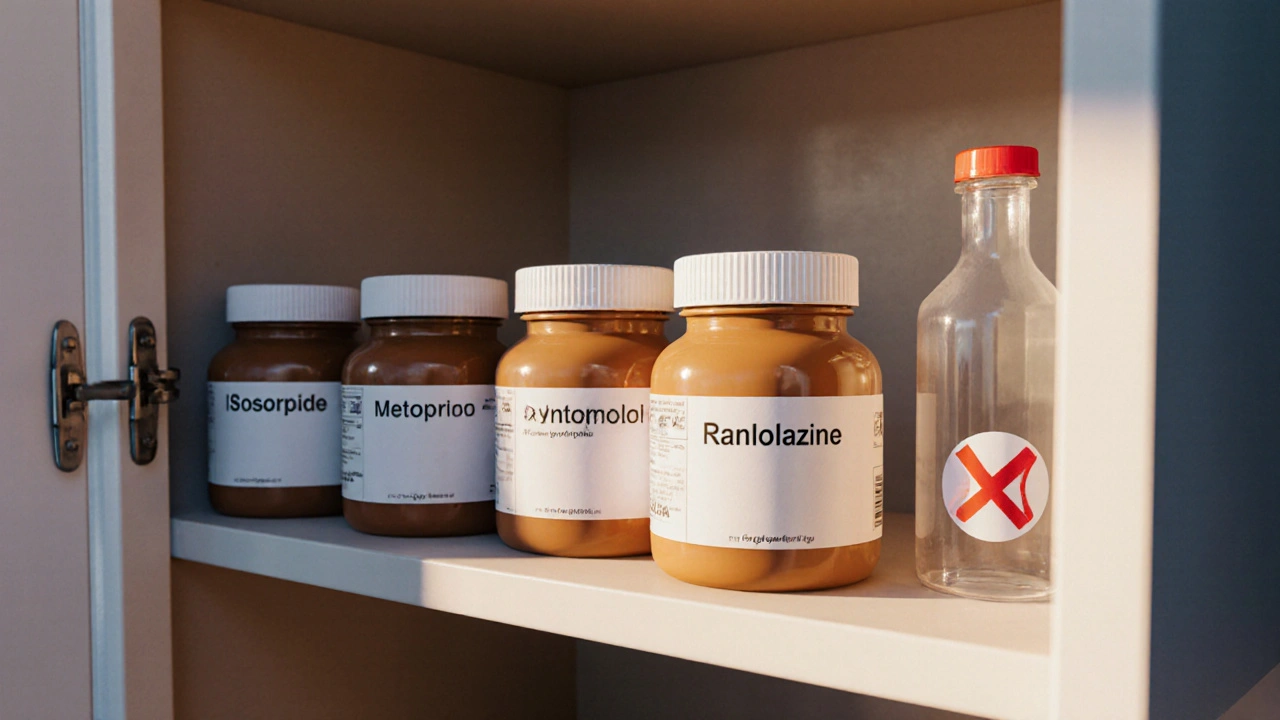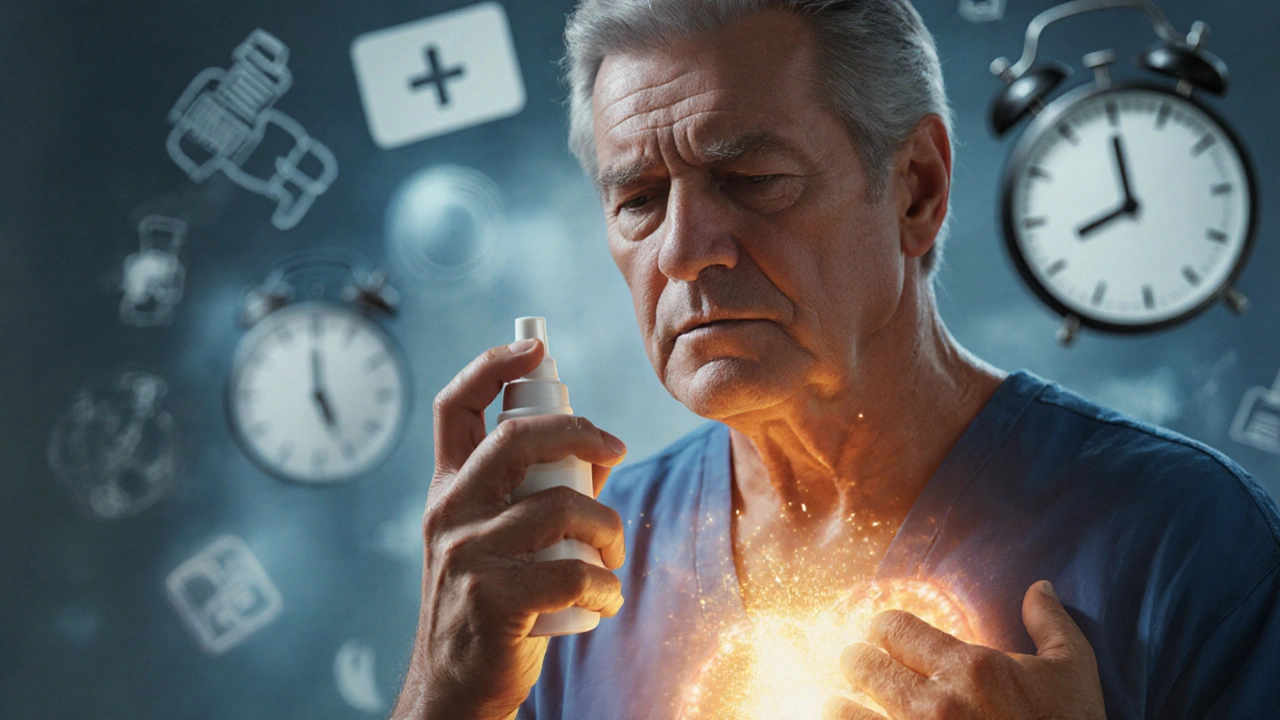Angina Medication Comparison Tool
Find Your Best Alternative
When your chest tightens like a vice, and you can’t catch your breath, nitroglycerin is often the first thing doctors reach for. It’s fast. It’s effective. But it’s not the only option. Many people on nitroglycerin wonder: Are there better, safer, or longer-lasting alternatives? The answer isn’t simple. It depends on your heart condition, your lifestyle, and how your body reacts to medication.
What nitroglycerin actually does
Nitroglycerin is a vasodilator. That means it relaxes and widens your blood vessels. For people with angina - chest pain caused by reduced blood flow to the heart - this lets more oxygen-rich blood reach the heart muscle. It works in seconds when taken under the tongue as a tablet or spray. That speed is why it’s called a "rescue" medication.
It’s not a cure. It doesn’t fix clogged arteries. It just gives your heart temporary relief. People with chronic angina often carry it everywhere - in their wallet, purse, or pocket. But long-term use has downsides. Tolerance builds up. You need higher doses over time. And side effects like headaches, dizziness, and low blood pressure are common.
Why people look for alternatives
Not everyone can tolerate nitroglycerin. Some get terrible headaches. Others feel faint after using it. Some can’t use it because they’re on erectile dysfunction drugs like sildenafil (Viagra) - mixing them can cause dangerous drops in blood pressure. Others want something that works all day, not just in emergencies.
Doctors often switch patients to other medications when:
- Nitroglycerin stops working as well
- Side effects become unbearable
- They need prevention, not just emergency relief
- They’re on other medications that interact with nitroglycerin
Top alternatives to nitroglycerin
Here are the most commonly prescribed alternatives, each with different strengths and uses.
1. Isosorbide mononitrate and isosorbide dinitrate
These are long-acting nitrates, similar to nitroglycerin but designed for daily use. Isosorbide mononitrate (Imdur, Ismo) lasts 8-12 hours. Isosorbide dinitrate (Isordil) lasts 4-6 hours. Both are taken as pills, not sprays or tablets under the tongue.
They’re not for sudden chest pain. They’re for preventing it. If you get angina during daily activities - walking uphill, climbing stairs - these help reduce how often it happens.
They still cause headaches and low blood pressure. But because they’re taken regularly, tolerance can be managed with a "nitrate-free" period - usually 10-12 hours a day without the drug. This helps reset your body’s sensitivity.
2. Beta-blockers (metoprolol, atenolol, propranolol)
Beta-blockers work differently. They slow your heart rate and lower blood pressure, which reduces how hard your heart has to work. Less workload = less oxygen demand = less angina.
They’re often the first choice for long-term angina management. Studies show they reduce heart attacks and improve survival in people with coronary artery disease.
Side effects include fatigue, cold hands, and sometimes depression or sleep problems. They’re not for people with asthma or very slow heart rates.
3. Calcium channel blockers (amlodipine, diltiazem, verapamil)
These relax the muscles in your blood vessels and heart. They’re especially useful if beta-blockers don’t work or aren’t safe for you.
Amlodipine (Norvasc) is a popular choice. It’s taken once a day and has fewer side effects than older versions. Diltiazem and verapamil also slow the heart rate, making them good for people with both angina and high blood pressure.
Side effects can include swelling in the ankles, constipation, or dizziness. But they’re generally well-tolerated and don’t cause the same tolerance issues as nitrates.
4. Ranolazine (Ranexa)
This is a newer option. Ranolazine doesn’t affect heart rate or blood pressure. Instead, it changes how heart muscle cells use energy. It helps the heart work more efficiently with less oxygen.
It’s usually added to other medications when angina still happens despite using beta-blockers or calcium channel blockers. It’s taken as a pill twice a day.
Side effects include nausea, dizziness, and constipation. It’s not for people with severe liver disease.
5. Aspirin and statins (the foundation)
These aren’t direct angina relievers, but they’re critical. Aspirin prevents blood clots. Statins (like atorvastatin or rosuvastatin) lower cholesterol and stabilize plaque in your arteries.
Many people with angina are on these long-term, even if they don’t realize it’s part of their treatment. Without them, other medications work less effectively.

Comparison table: Nitroglycerin vs alternatives
| Medication | Use | Onset | Duration | Key Side Effects | Best for |
|---|---|---|---|---|---|
| Nitroglycerin | Emergency relief | 1-3 minutes | 5-10 minutes | Headache, dizziness, low BP | Sudden chest pain |
| Isosorbide mononitrate | Prevention | 30-60 minutes | 8-12 hours | Headache, tolerance | Daily angina triggers |
| Beta-blockers | Prevention | 1-2 hours | 12-24 hours | Fatigue, cold extremities | High BP + angina |
| Calcium channel blockers | Prevention | 1-2 hours | 24 hours | Ankle swelling, constipation | Intolerance to beta-blockers |
| Ranolazine | Add-on therapy | 1-2 hours | 12 hours | Nausea, dizziness | Angina despite other meds |
What doesn’t work as a replacement
Some people try natural remedies or over-the-counter supplements. Garlic, hawthorn, or coenzyme Q10 are sometimes suggested. But there’s no solid evidence they prevent angina attacks or reduce heart attack risk like prescription drugs do.
Don’t replace nitroglycerin with supplements. If you’re having chest pain, waiting to see if a herbal pill works could be dangerous.

When to talk to your doctor
Don’t stop or switch medications on your own. But you should call your doctor if:
- Your nitroglycerin doesn’t relieve pain within 5 minutes
- You need more than 3 doses in 15 minutes
- You get chest pain at rest, not just during activity
- You’re having more frequent angina attacks
- You’re on Viagra, Cialis, or similar drugs
These could mean your heart condition is worsening. Your doctor may adjust your meds, order tests, or recommend procedures like angioplasty.
Real-world experience
One patient in Bristol, 68, had been using nitroglycerin spray for 7 years. He got headaches every time. His doctor switched him to amlodipine and low-dose metoprolol. His angina improved. His headaches vanished. He now walks 3 miles a day without pain.
Another woman, 56, couldn’t use nitrates because she took sildenafil for pulmonary hypertension. Her doctor added ranolazine to her statin and aspirin. She went from 4-5 angina episodes a week to 1-2 a month.
There’s no one-size-fits-all. What works for one person might not work for another. The key is finding the right mix - and sticking with it.
Final thoughts
Nitroglycerin saves lives in emergencies. But it’s not meant to be your only defense. Modern heart care uses a layered approach: prevention, daily meds, and rescue tools. The best plan combines the right combination of drugs - and lifestyle changes like quitting smoking, eating well, and staying active.
If you’re on nitroglycerin and wondering if there’s a better option, talk to your doctor. Don’t assume it’s the only choice. There are safer, longer-lasting, and more comfortable alternatives - if you know where to look.
Can I use nitroglycerin with Viagra?
No. Mixing nitroglycerin with erectile dysfunction drugs like Viagra, Cialis, or Levitra can cause a sudden, life-threatening drop in blood pressure. You must wait at least 24 to 48 hours after taking nitroglycerin before using these medications - and only under a doctor’s supervision.
Why does nitroglycerin stop working over time?
Your body develops tolerance to nitrates with continuous use. This means the same dose becomes less effective. Doctors manage this by giving you a daily "nitrate-free" period - usually 10-12 hours without the drug - so your body resets its sensitivity. Skipping doses or using long-acting nitrates with a break period helps prevent this.
Are there any natural alternatives to nitroglycerin?
No reliable natural alternatives exist for treating angina. Supplements like garlic, hawthorn, or CoQ10 may support heart health, but they don’t stop chest pain attacks or replace prescription meds. Relying on them instead of nitroglycerin during an angina episode can be dangerous.
What’s the best long-term medication for angina?
There’s no single "best" - it depends on your health. Beta-blockers and calcium channel blockers are most often used for long-term prevention. Many people take both along with aspirin and a statin. The goal is to reduce how often angina happens, not just treat it when it strikes.
Can I stop taking nitroglycerin if I start a new medication?
Never stop nitroglycerin without your doctor’s advice. Even if you start a new daily medication, nitroglycerin remains your emergency safety net. Your doctor will guide you on when and how to reduce or stop it - usually only after your new meds are working well and your angina is under control.

